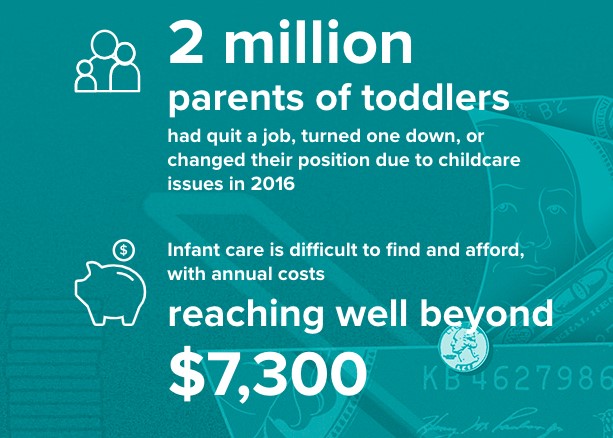At the start of an individual’s career, child care most likely is not at the center of his or her employee benefits concerns. But, as people venture further into their careers, the chances increase that they’ll need to find a childcare provider to be able to progress in their jobs, which is not necessarily an easy task. About half of U.S. families struggle to find appropriate programs for their children.
A CAP survey also found that mothers who are not able to find proper child care end up raising their child full-time, which often causes them to exit the workforce. Barriers such as cost, program availability, and some programs’ overall quality prevent parents from connecting with the right childcare provider for their family. Overall, the high cost of enrolling children in these programs is what’s deterring the greatest percentage (31%) of respondents.
Supporting New Parents for Improved Retention
There are several measures small businesses can take to ease the difficulty of child care and allow young parents, particularly mothers, to remain in their professional roles:
- Offer a daycare stipend.
- Provide on-site day care.
- Implement employee concierge services.
Implementing these measures will encourage employees to stick with your company as they age because they know you care about their family’s future.
1. Offer a Daycare Stipend
The idea of providing child care might seem like a big undertaking for both parents and small businesses. The logistical burden of managing an in-house childcare program may be too much for your business to handle, as reliable childcare programs can cost thousands of dollars every year. Millions of employees, though, have to balance work with raising children.
Even a small monthly contribution from an employer can help employees cut down on the often prohibitive costs of child care. One solution you can offer new parents is a daycare stipend, or a set amount guaranteed per month that employees can use for child care.
Another option is to tax-advantage daycare spending—an approach taken by companies like Apple. This system works a lot like a health savings account (HSA) or a flexible spending account (FSA), allowing employees to set aside pretaxed dollars to pay for day care.
-
Provide On-Site Day Care
Your business also can review options for on-site day care. When employers take responsibility for child care, job satisfaction increases, while out-of-office days and turnover both decline dramatically. Companies such as Nike, Google, Home Depot, and Patagonia have made on-site child care work for their business. Patagonia’s CEO cited the following benefits from continuing the 36-year program:
- About 91% of costs are recovered due to increased retention, tax benefits, and employee engagement.
- There has been success in fostering a trusting workplace culture.
- Women fill about half of the company’s upper management positions. Retaining them can help you retain a lot of organizational knowledge.
While implementing an in-house childcare program might appear intimidating, it’s proven to be more cost-effective than expected for several companies.
3. Implement Employee Concierge Services
Concierge services are designed to make work/life balance easier for employees. A concierge can be responsible for handling tasks throughout the day that an individual may not have time for, including automotive checks, dry cleaning, and even arranging child care. These services will free up time during the day for employees to invest in their families and their profession.
Companies can opt to fund a concierge program for their highest-performing workers, but another option is to implement an employee-sponsored concierge service, which is an affordable and manageable option.
Investing in quality child development centers or in-home child care is an additional way to offer specialized services to benefit new parents. Regardless of what form concierge services take and how they’re integrated into your policy, they have the potential to play a key role in corporate benefits policies for small businesses.
Take Your Childcare Policy Seriously
More than 2 million parents modified their professional situation due to issues with child care in 2016. Businesses can prevent excessive turnover and absences by supporting parents financially or with in-office care programs.
This will make your employees happier, give them confidence in their child’s safety, and foster productivity.
Sydney Wess is a Content and Editorial Associate for Clutch. She curates and processes reviews content that helps business buyers find, short-list, and compare top service providers for their company’s needs.


